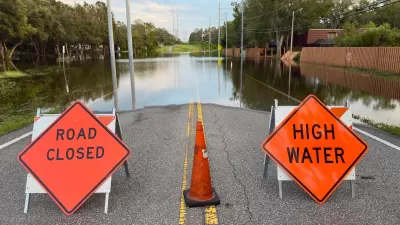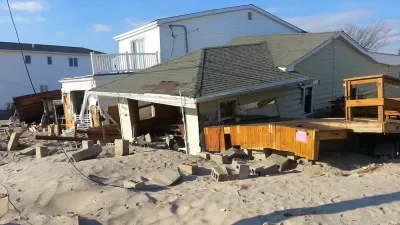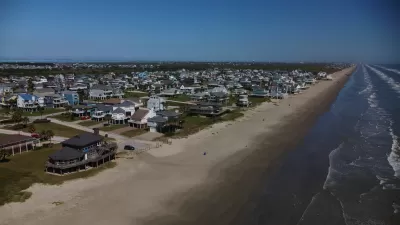Changes to how FEMA calculates flood risk will assess risk at a home-by-home level, rather than estimating the same risk to all homes in the same floodplain.

FEMA's recent updates to its flood insurance program "will sharply raise the cost of flood insurance for many high-value homes in coastal states like Florida, sending dramatic new signals to current and potential waterfront homeowners about the risks they face from extreme weather fueled by climate change."
As reported by Jake Bittle, the new system "has triggered one of the most contentious climate adaptation debates in recent memory." While both sides agree that "the changes reflect a more accurate assessment of flood risk," some politicians "have petitioned FEMA to delay the rollout, hoping to protect their constituents from a decrease in property values that may accompany higher insurance premiums."
In its first update since the system was instituted in the 1960s, FEMA's risk analysis system now "estimates the individual risk facing each home, incorporating mountains of new data about water dynamics and the replacement cost for each home. The result is that homeowners will now pay premiums that reflect the specific flood risk for their home, rather than their general area." These changes rectify old inequities which forced some homeowners in an area to subsidize the costs to higher-risk homes.
"Still, this new rating system represents a partial fix to a program that has fundamental and longstanding issues." With heavily subsidized insurance rates, "The cost of insurance wasn’t high enough to discourage people from living in floodplains, so they just kept building near the water." This underfunding of the program was sharply felt "in 2005, when the claim payouts from Hurricanes Katrina and Rita plunged the program into a $20 billion debt hole that it still hasn’t emerged from."
"The changes from Risk Rating 2.0 are technical in nature, but they have serious political implications: The largest premium increases under the new system are for higher-value homes that are closer to the water." But politicians continue to advocate on behalf of wealthy homeowners. "[T]he spat over Risk Rating 2.0 centers around a question that will only become more relevant as climate change gets worse: How much should the public subsidize risky activity in economically important spheres like real estate?"
FULL STORY: FEMA’s new flood insurance plan is drawing the battle lines over climate adaptation

Trump Administration Could Effectively End Housing Voucher Program
Federal officials are eyeing major cuts to the Section 8 program that helps millions of low-income households pay rent.

Planetizen Federal Action Tracker
A weekly monitor of how Trump’s orders and actions are impacting planners and planning in America.

Ken Jennings Launches Transit Web Series
The Jeopardy champ wants you to ride public transit.

Washington Legislature Passes Rent Increase Cap
A bill that caps rent increases at 7 percent plus inflation is headed to the governor’s desk.

From Planning to Action: How LA County Is Rethinking Climate Resilience
Chief Sustainability Officer Rita Kampalath outlines the County’s shift from planning to implementation in its climate resilience efforts, emphasizing cross-departmental coordination, updated recovery strategies, and the need for flexible funding.

New Mexico Aging Department Commits to Helping Seniors Age ‘In Place’ and ‘Autonomously’ in New Draft Plan
As New Mexico’s population of seniors continues to grow, the state’s aging department is proposing expanded initiatives to help seniors maintain their autonomy while also supporting family caregivers.
Urban Design for Planners 1: Software Tools
This six-course series explores essential urban design concepts using open source software and equips planners with the tools they need to participate fully in the urban design process.
Planning for Universal Design
Learn the tools for implementing Universal Design in planning regulations.
Heyer Gruel & Associates PA
Ada County Highway District
Institute for Housing and Urban Development Studies (IHS)
City of Grandview
Harvard GSD Executive Education
Toledo-Lucas County Plan Commissions
Salt Lake City
NYU Wagner Graduate School of Public Service





























